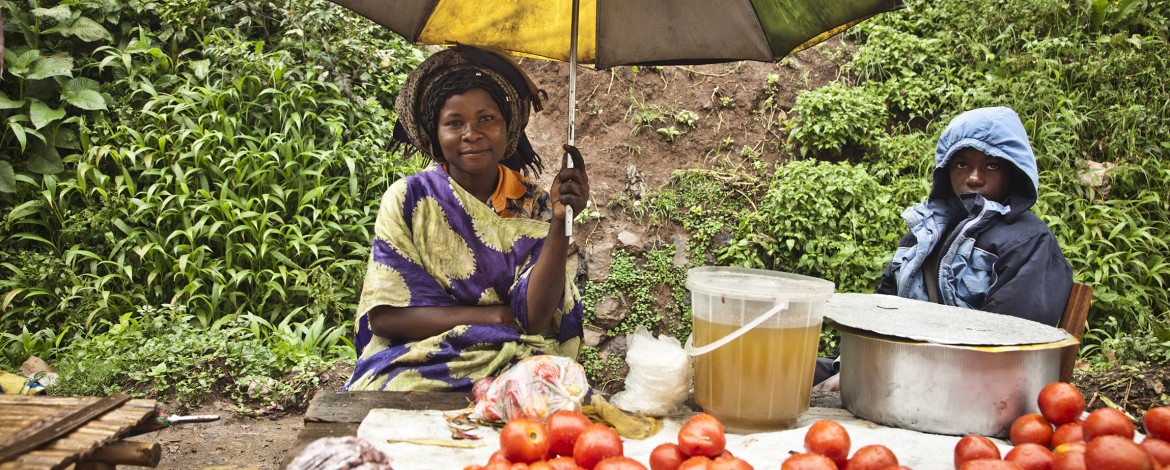About us
Topics
DECENT WORK
Decent Work is a concept developed by the International Labour Organization (ILO). It guarantees sufficient resources to meet basic human needs. It is based on four pillars: the creation of sustainable jobs and livelihoods, improved working conditions, social protection and social dialogue. It involves the elimination of forced labour, the abolition of child labour, the elimination of racial or gender discrimination in employment, etc.
Through the 2017-2021 "Decent Work" Programme implemented jointly by FOS, IFSI and Solsoc, our organisations aim to promote the implementation of the various dimensions of Decent Work for workers in the formal and informal economy.
With the support of its trade union partners, the Centrale Générale and Centrale Horval of the FGTB and the Mutualités socialistes UNMS/NVSM, the joint programme thus strengthens 24 partners and 308 grassroots organisations in the fields of the social and solidarity economy, social protection, the defence of workers' rights, democracy and citizenship.
The social and solidarity economy
As an economic alternative to the neoliberal model, the social and solidarity economy promotes a system based on democratic participation and solidarity, rather than competition and the pursuit of profit at all costs. In both North and South, the model is growing and succeeding.
For Solsoc, the social and solidarity economy is a real strategy for creating decent jobs and improving living conditions. Whether in urban or rural areas, it is mainly aimed at the informal sector and helps to rethink production, processing and marketing methods, as well as the economic management of cooperatives. The results are not only reflected in terms of income, but also in quality of life, sustainability of dynamics, inclusion of the most vulnerable, environmental protection, etc. Solsoc therefore intends to strengthen the capacities of partner NGOs in the South and support cooperatives and other economic dynamics with particular attention to women and youth.
These initiatives are supported by Solsoc in Senegal, Burkina Faso, DRC, Burundi, Bolivia, Colombia and Morocco with the support of P&V insurance.
social protection
Everyone experiences moments in their lives when they are more vulnerable. This is the case in particular when you fall ill, have an accident, but also when you lose your job,... What we know in Belgium as social security is an individual insurance system based on solidarity and a collective responsibility of society. It is about ensuring access to health care and alternative incomes that form a safety net for continuing to live a dignified life in difficult times. Social protection is a universal right, enshrined in the Universal Declaration of Human Rights since 1948. Yet only 27% of the world's population has access to social security coverage. In Africa, where the most urgent challenge is access to health, more than 80% lack access to social protection.
For Solsoc, it is essential to strengthen this framework and also to protect it in countries where social protection systems are fragile or in the process of privatisation. This is why, with the support of UNMS and the Solidaris federations (WAPI, Solidaris Charleroi, Solidaris Liège, Mutualité du Brabant), Solsoc supports in 4 African countries (Senegal, Burkina Faso, Burundi and DR Congo) the extension of community health insurance schemes to enable families from the rural and informal sectors to access medical care.
Democracy, human rights and participation
For Solsoc, development necessarily requires respect for human rights and democracy. This may seem obvious, yet... While racist and authoritarian extremes are on the rise, threats to social movement leaders, environmental activists and minority advocates are getting darker. Despite these difficulties and in an attempt to resist them, we support the participation of civil society organizations and in particular young people and women in the definition of public policies that concern them, whether social, agricultural or commercial.
Solsoc and its partners North and South defend:
- International law and the implementation of UN resolutions
- The right of peoples to self-determination in complete independence and sovereignty
- The right to compensation for victims of violations of their rights or attacks on their physical or moral integrity
- Equal rights between men and women
- Compliance with social and environmental standards in international trade treaties
- The right to adequate and sustainable food and the right to land
